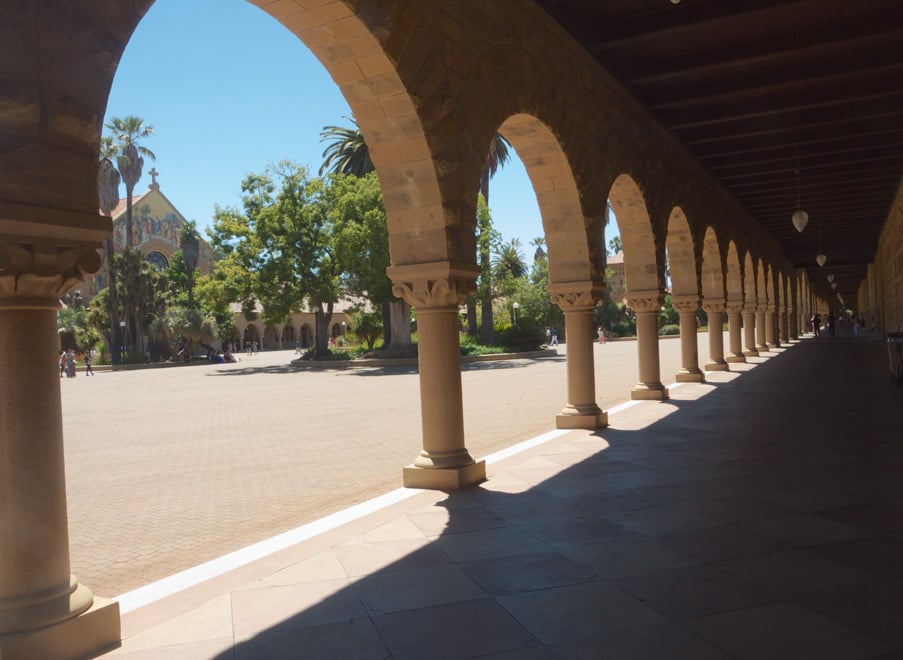This article is the second installment in a series examining how faculty and students are adapting to online classes. See the first article here.
For the first time ever, Stanford undergraduates are being forced to choose classes for a completely virtual quarter.
When selecting classes for the spring, six students interviewed by The Daily considered a variety of new factors, including how courses would adapt to a virtual setting and the Satisfactory/No Credit (S/NC) grading policy.
Kyle Wang ’22, an English major minoring in math, said he is taking fewer discussion-based classes because he feels that the virtual setting would inhibit his learning. He was originally planning to take a law school class capped at 18 students. However, he said, he decided that the online experience wouldn’t compare to an in-person course.
“Not being able to be physically present in a classroom environment — where the discussion was so important — was just going to detract a lot from my experience of the course itself, so for me, it really didn’t make sense to take that class,” Wang said.
This quarter, Wang’s 20 unit load includes CS 107 and STATS 116. He is “using the quarter to get some requirements out of the way,” he said.
Instead of taking more degree-required coursework, at least one student is taking fewer. Nuzhah Tarsoo ’22 doesn’t normally take classes outside of her major that could lower her GPA or count against her limit of Credit/No Credit courses, she said, but the quarter’s new grading basis and departmental exceptions for S/NC credit limits have encouraged her to take mostly classes outside of her earth systems major.
Tarsoo, one of approximately 600 students remaining on campus, also cited a lack of social obligations as another reason she is taking EARTH 83: “Nature Journaling” along with other humanities-oriented courses.
“It’s just us and our own personal space [on campus],” Tarsoo said. “[Normally] the way that my schedule is laid out, I have other kinds of responsibilities and there’s not really the space or quiet time … to sit down and produce things related to self-consciousness or consciousness of nature.”
Instead of leaning into isolation like Tarsoo, Angel Pan ’21 said he is using academics to stay connected with friends. Pan is staying in Singapore, which is 15 hours ahead of the West Coast.
“It’ll be easier to keep in touch with people if you’re in the same classes, especially if you’re in a different timezone,” Pan said. “When people would ask me to take classes with them, then I would just agree to take extra units, so I am taking a bit more than I would normally.”
The Faculty Senate’s decision to switch all spring courses to mandatory S/NC grading affected how most of the interviewed students chose their courses. Pan said the policy allowed him to take more courses than normal, for a total of 19 units.
“I wouldn’t be able to handle that many units if that was not the policy,” he said. “Considering the policy, most classes should be [an] okay [workload].”
The increase in high course loads among students prompted Dean of Academic Advising Louis Newman to caution students and remind them to account for the challenges of online learning.
“Some of you may be thinking: with all classes online, and the shift to S/NC grading this quarter, this is a good time to take additional units …” Newman wrote in an email to students. “On behalf of all of us in Academic Advising, we urge you to think very carefully about these choices.”
Students interviewed said they would be open to dropping a course if they felt overwhelmed. But, in addition to enabling a more rigorous course load, students widely agreed that the lack of letter grades freed them to focus on their learning.
“[This first week,] I felt a lot less stressed about my classes and I asked a lot more questions,” Julia Briones ’22 said. “Instead of feeling like keeping up with a checklist, I was like: Let me do what I can to learn. If I don’t get to all the things on my to-do list, it’s okay. It’s going to be fine. I don’t need to stress myself about the small, unnecessary details.”
Contact Ravi Smith at ravi22 ‘at’ stanford.edu.
